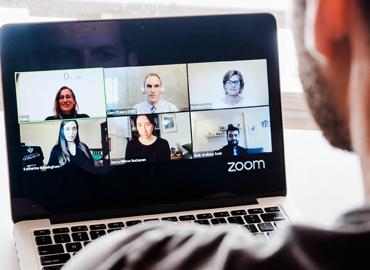U of T gears up for biggest Three Minute Thesis competition yet — and it’s all virtual

The University of Toronto’s 2021 Three Minute Thesis (3MT) competition will be its biggest yet.
Last year, the annual competition, which challenges graduate students to present their research in three minutes or less, was forced to move online due to the COVID-19 pandemic. Despite the challenges that came with migrating to a new medium, the virtual competition was a huge success, with over 400 viewers tuning in to watch the finals on Zoom and Facebook Live. When registration opened for this year’s competition, enrollment increased by over 30 per cent.
“Moving online has been amazing for 3MT,” says Liam O’Leary, coordinator of graduate programming at the School of Graduate Studies’ Centre for Graduate Professional Development. He has been running the competition since 2014 and is thrilled that more people are getting to see the range of academic expertise at U of T. “The audience is so much bigger, and so many more people are able to watch their family and friends. I think it’s one of the few positive things to have come from the pandemic.”
Starting March 9, over 130 registrants will compete in this year’s heats for a chance to advance to the final, which will be held on March 31. This year the School of Graduate Studies will also be launching a separate 3MT competition for U of T’s postdoctoral fellows, who can choose to present on their doctoral research or their current work. Liam says the new competition is a way to offer more for the postdoctoral fellows and help them feel a greater sense of connection to the graduate community at U of T. The inaugural postdoctoral 3MT will take place on March 24 from 5:30 pm to 7:30 pm.
The annual 3MT competition, which takes place at the local, provincial, and national levels, challenges graduate students to present their research to a panel of non-specialist judges in three minutes or less. To win U of T’s top spot—which comes with a $1000 cash prize and an opportunity to advance to the provincial-level final—competitors must present their research in an accessible, clear, and engaging way. It’s a great way for students to master an important aspect of graduate professional development—communicating their research.
“It’s so challenging to shift how we are taught to write as researchers,” says Amalia Gil, who earned first place in last year’s competition before placing first at the provincial final in January 2021. “But that’s just not the way to communicate your research to a wider audience.”
Amalia, whose presentation focused on identifying distractions in operating rooms with eye-tracking equipment, says the competition helped her develop her research. “You have to go beyond the particular details of your research and ask—What am I really doing? What is the actual objective of my research?”
It’s a skill that Amalia has been able to transfer to her new job as a Clinical Implementation Engineer with Surgical Safety Technologies, where she works with IT staff, clinicians, and biomedical engineers to incorporate OR black-box technology into operating rooms across Ontario, the U.S., and Europe. “I think the biggest thing you learn is how to pitch,” she continues. “If you have a really cool idea and you have to pitch it to leadership—how do you make them want it? You can apply that to anything you want—whether it’s pitching to a startup or something that you want to change at work or an idea to do with your research. Try and do it in three minutes! I bet the leadership will love it.”
Though distilling one’s research and presenting it to an audience of hundreds might seem daunting, students considering 3MT can find many supports at SGS to help them with their presentations. Earlier this year, the School of Graduate Studies offered a live virtual training session with previous 3MT winner Christina D’Amico, with a recorded version now available on demand through the Graduate Centre for Academic Communication (GCAC). In addition, SGS is also hosting viewing parties—training sessions where participants can watch and discuss recordings of winning 3MT presentations from across Canada. “It’s a bit like a book club,” says Liam. “We see what works and then we discuss it.”
With these supports in place and a generous registration policy, Liam expects to see an uptick in registration before the heats draw to a close. “We’re being extremely generous with our registration deadlines this year because we want to encourage students to participate,” he says. This year, students can register as late as two days before the heat they’d like to participate in — provided spots are available.
Amalia Gil also hopes her experience will inspire other graduate students to try 3MT. In addition to representing U of T at the Ontario-wide finals, she also took her work to the Northeastern Association of Graduate Schools’ 3MT finals and the Council of Graduate Schools’ 3MT Showcase, where she competed alongside students from schools across the U.S. When asked if she has any advice for students considering 3MT, Amalia doesn’t hesitate. “Just do it!” she says. “Even if you don’t go far, it’s a really fun challenge. It’s about learning new communication skills and getting your research out there.”
This year’s 3MT was held virtually on Wednesday, March 31, 2021. Read about previous University of Toronto 3MT winners.
Back to U of T gears up for biggest Three Minute Thesis competition yet — and it’s all virtual
